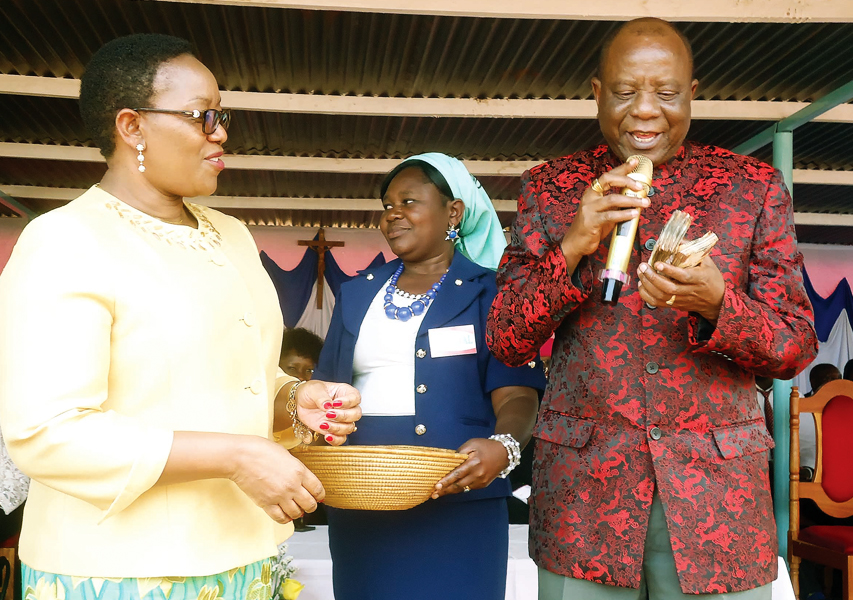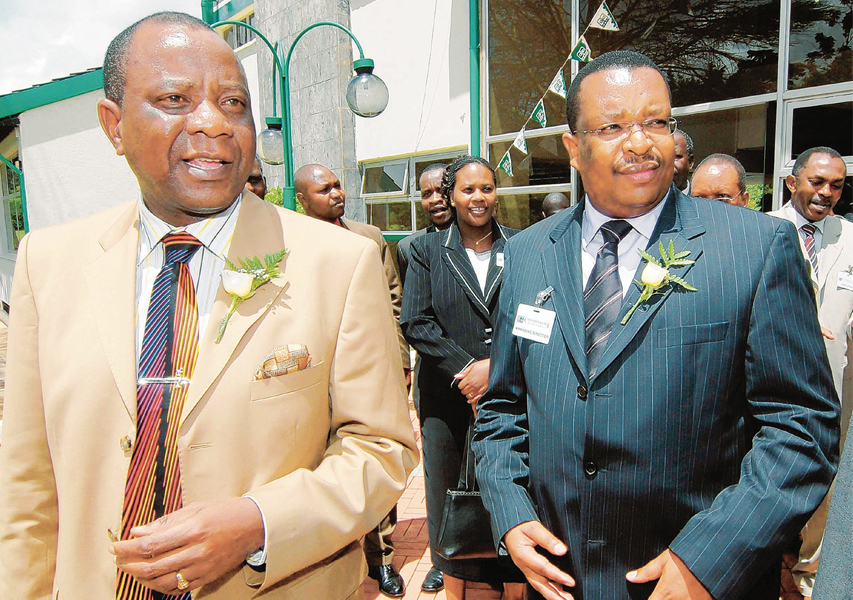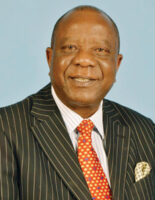
Peter Njeru Ndwiga, the Minister for Cooperative Development and Marketing in the first of President Mwai Kibaki’s two terms, was one of the most loyal and non-controversial ministers. The Member of Parliament for Manyatta Constituency was also the only Cabinet Minister at the time from the then Embu and Mbeere districts.
The political collaboration between Kibaki and Ndwiga that culminated in his appointment to the Cabinet started in 1991, in the formative days of the Democratic Party (DP), which Kibaki founded and led. Ndwiga was very committed to Kibaki’s cause and did a lot of heavy lifting to rally the four constituencies in his region – Siakago and Gachoka in Mbeere, and Manyatta and Runyenjes in Embu – to support Kibaki when he ran for President in 1992.
Ndwiga was one of the legislators who rode to Parliament on a DP ticket in the same year, being elected as the MP for Runyenjes Constituency. He easily retained his seat in 1997 via the same party.
When DP joined with other Opposition parties to form the National Rainbow Coalition (NARC) in preparation for the 2002 General Election, Ndwiga moved with Kibaki. It was after he had won his seat, by a very comfortable margin on a NARC ticket, that Kibaki appointed him to the Cabinet.
One of Ndwiga’s achievements during his time at the helm of the Ministry of Cooperative Development and Marketing was to have Kenyan coffee listed as one of the country’s exports to the United States of America. This was facilitated by the African Growth Opportunity Agreement (AGOA).
The inclusion of Kenyan coffee as an export to the US was a complete departure from the trade arrangement that had been in place before. In the new agreement, Kenyan coffee would be fully processed, packaged and sold to the US under a Kenyan brand name.
Before then, local coffee was auctioned at the Nairobi Coffee Exchange in its raw form. Buyers would then process and resell it under their brand names at higher prices.
With the AGOA agreement in place and in liaison with the Kenya Planters Cooperative Union (KPCU), Ndwiga’s ministry moved to acquire modern coffee roasting and packaging machines. He marshalled players in the industry to move swiftly and exploit the new market.
In negotiating for direct sales of Kenyan coffee to the US market, his mission was to weed out middlemen who exploited local farmers. This would enable the farmers to accrue maximum returns from their produce. The effect was deep and far-reaching. Again, the change from the former way of doing things was being felt immediately under the new NARC administration.
Towards the end of his tenure as Minister, Ndwiga would make another revolutionary move to rid the coffee industry of middlemen. In conjunction with the sector’s regulator, the Coffee Board of Kenya, he released a gazette notice that completely changed operations in the coffee market.

The new regulations restricted each player in the market to one licence for a particular market function. This policy shift was informed by farmers’ complaints that some merchants had ventured into coffee milling, marketing and even trading at the Nairobi Coffee Exchange. They argued that this practice gave the merchants overriding influence over such critical business aspects as pricing.
In Ndwiga’s view, presenting dealers as marketers was a monopolistic mistake that accounted for low coffee producer prices.
Still on matters coffee, Ndwiga will be remembered for his efforts to enforce the Cooperative Act, pushing for the amalgamation of cooperative societies.
Convinced that in the absence of strong cooperatives farming would not be lucrative even if the government improved marketing, the Kibaki administration moved to have farmers’ cooperative societies merged so as to streamline them and boost farmers’ bargaining power.
In its analysis of the coffee sector, the government concluded that lack of strong cooperatives was the major cause of crises in the sector. At the time NARC ascended to power, most of the coffee cooperative societies were deeply in debt. They had accumulated huge loans in the previous 15 years and most of the loans were non-performing. This significantly hurt their capacity to execute their responsibility of marketing their members’ farm produce.
Most farmers in Nyeri and Murang’a districts warmed up to the merger idea but a few planted hurdles in Ndwiga’s path. For example, 15 coffee growers’ societies that had, in 1996, broken away from the giant Mathira Farmers Society, refused to endorse the merger plan.
They came up with a raft of conditions that they wanted Ndwiga to meet before they could agree to embrace the policy. To begin with, the farmers demanded an assurance from the Minister that he would flush out middlemen from the coffee marketing chain.
One of Ndwiga’s achievements during his time at the helm of the Ministry of Cooperative Development and Marketing was to have Kenyan coffe elisted as one of the country’s exports to the United States of America
The farmers also insisted that Ndwiga had to consult them directly on the merger plans. They did not want him to assume that the decisions made by the cooperative society officials bound everyone. Lastly, they demanded that he should formally write to them outlining the benefits that would come from such a merger.
Stakeholders with long experience in the agriculture sector attributed the farmers’ reluctance concerning the merger to mistrust. Farmers in the Mt Kenya region had had a difficult relationship with the previous regime, which they accused of sabotaging their economy as a form of political punishment.
Ndwiga’s position was clear – he wanted farmers to engage both local and external markets through their cooperatives. This was also President Kibaki’s position and Ndwiga’s task was to win the farmers’ buy in.
He went about the task with his characteristic commitment; nevertheless, the President decided that the farmers needed to hear the plan from his own lips. During his 2004 Easter holiday visit to Nyeri, Kibaki made it clear that he supported Ndwiga’s stand. Expressing his awareness of the problems bedevilling the coffee sector, he also assured the people that his Minister would get the farmers better prices abroad. He urged them to discuss their problems with Ndwiga and to trust his intentions.
While no dissenting voices emerged from Kibaki’s Cabinet on the cooperative society merger policy, the new marketing model did split the Cabinet. So divergent were the views that the matter eventually moved to Parliament.
In the debate on how to mitigate farmers’ suffering as a result of poor prices, one question stuck out like a sore thumb. Was it better to allow the farmers a free hand to sell their coffee at their farms to whoever they wished (a model also known as the second window) or insist that they market it through their cooperatives to a centralised international auction system?
Ndwiga and Kipruto arap Kirwa, his Agriculture counterpart, held directly opposing views on this matter. Ndwiga supported a centralised auction system supplied through cooperatives while Kirwa argued in favour of a second window sales model, reasoning that it would restore the coffee industry’s lost glory because farmers would enjoy the liberty of selling their coffee directly to the highest bidder without having to foot heavy marketing and distribution costs.
Obviously, if it was adopted, the second window model would have undone all of Ndwiga’s efforts to clean up the cooperative movement in Kenya. In a counter-argument, he and his supporters argued that the second window model would encourage theft – one could steal the coffee at night and sell it to someone else the same night, and that person would in turn sell it the next day.
Ndwiga also held the view that second window marketing would escalate the coffee industry crisis. He argued that contrary to popular belief, low coffee prices would persist even after reduction of the initial speculative prices. He was convinced that the auction marketing system was the way to go since it guaranteed a year-long market for coffee and would as such help product standardisation and allow the establishment of future markets.
He also feared that the second window model – or farm-gate as they called it – would compromise produce quality, balkanise the industry and give Kenyan coffee a bad name in the global market.
In a petition to Kirwa on the matter, KPCU members asked him to reconsider his position. The union argued that second window marketing would not have proper quality regulations and checks. Further, it practically represented the collapse of the coffee cooperative society sector – such a collapse would take down with it farmers’ bargaining power. Finally, the union members said, the model would inhibit farmers’ access to credit facilities as no financial institution would deal with farmers who sold their produce without a recognised and creditworthy agent.
During his time at the ministry, Ndwiga also oversaw the writing off of debts so as to salvage cash-strapped cooperative societies. A good case in point is the Nyamira tea farmers. On 8 February 2005, while addressing a public rally in Nyamira District, Kibaki directed Ndwiga to waive all the loans owed by tea farmers in addition to ensuring the revival of all local cooperative societies, such as the Kenya Cooperative Creameries (KCC).
On assuming office, the Kibaki administration had generated an Economic Recovery Strategy for Wealth and Employment Creation (ERS). Later, in 2004, the government adopted a Strategy for Revitalisation of Agriculture (SRA). That was Kibaki’s way of implementing the principles of the ERS within the agriculture sector, and was the policy paperwork on which the revival of KCC was pinned.
In August 2003, the Minister facilitated the injection of KES 600 million into KCC to cushion dairy farmers from low milk prices during the high milk supply season. The KCC revival was no doubt one of the success stories of Kibaki’s administration.
In 2007, Ndwiga contested the Manyatta parliamentary seat with all the advantages of incumbency. By that time he had maintained his grip on the seat for 15 years – no mean feat.
Many took it for granted that such a long-standing supporter of Kibaki, whose association with the President predated the multiparty era, would sail through the election. On the ground, producer prices for milk had gone up under his watch and he had also managed his Constituency Development Fund (CDF) prudently, manifested in the many schools and health clinics he built in the constituency. Ndwiga even published a constituency newsletter in which he accounted for the CDF.
But in an unexpected turn of events, he was floored in the elections by Emilio Kathuri, a businessman. The loss saw him exit Kibaki’s Cabinet and the Cooperatives docket was handed to Joseph Nyagah in the 2008 grand coalition government that had Kibaki as President and Raila Odinga as Prime Minister.
Asked in a 2008 interview to help demystify Kibaki, Ndwiga described the President as an independent-minded leader. According to him, Kibaki had no particular people whispering in his ears. Instead, he sought advice from time to time from people he felt could be useful in a given circumstance.
Ndwiga was born on 4 January 1954 in Manyatta and attended Kibugu Primary School before moving to Kamama Secondary School and then Siakago High School. He attended Cooperative University College for a diploma in business administration in 2014.
He had an illustrious professional career before going into elective politics in 1992. From 1975 to 1976, he worked for Coca-Cola as an assistant accountant. In 1977, he joined American Insurance Company as a sales representative and was promoted to unit manager in 1979. In 1984 he became the company’s agency manager in charge of the Mt. Kenya region.
Kibaki did not forget his loyal friend and collaborator of many years. On 10 April 2012, he appointed Ndwiga Chairman of the Export Promotion Council for a term of three years.
In 2014, President Uhuru Kenyatta appointed him Chairman of Tanathi Water Services Board, and in 2017, Ndwiga made a political comeback when he was elected Senator for Embu County. Today he chairs the Senate Agriculture Committee and interestingly, ‘coffee talk’ is never far from his lips – under his chairmanship, discussions on a drastic overhaul of the coffee marketing sector to pave the way for modernisation have gained currency.
